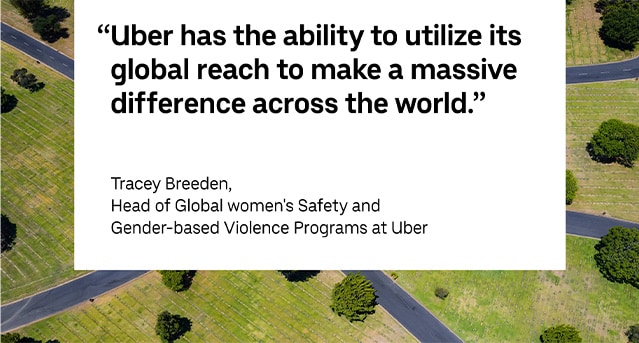The scope of the global epidemic is staggering: One in three women will experience sexual or physical violence at some point in their lives. It’s a problem that Tracey Breeden has spent much of her career working to address. A former law enforcement official, Breeden is now the head of global women’s safety and gender-based violence programs at Uber. With roughly 17 million rides per day in cities around the world, Uber is not immune to the challenge of addressing sexual and physical violence, which affects every industry and community. Yet the company’s global scale is also a critical asset in helping to develop solutions, according to Breeden.
“Being able to step into a place like Uber, I have the opportunity to reach the world, to make a difference,” she said.
Since joining Uber in 2016, she has steered a series of initiatives to raise awareness about sexual violence and help create safer spaces. And with interventions ranging from user education to philanthropic support and a first-of-its-kind safety report, these initiatives are as relevant to the rest of the world as they are to Uber’s core business. “We have a responsibility to our cities and our communities, not just the people who are actually using our platform,” Breeden said. “We have an opportunity to help create a safer environment for everyone.”
This vision is consistent with a growing standard of corporate governance. The private sector is leading in efforts to help find solutions to climate change, develop technologies to support social justice activism and promote economic welfare.
This shift reflects new expectations from the public, too. A recent survey reported that more than 76 percent of respondents wanted CEOs to take the lead on change. Some 73 percent believe a company can take actions that both increase profits and improve economic and social conditions. “Sentiment is increasingly that a company needs to stand for more than just a product,” said Caroline Kaeb, senior fellow at the Zicklin Center for Business Ethics Research at the University of Pennsylvania’s Wharton School. “It needs to stand for some larger-than-self values.”
At Uber, the work of Breeden and her team on broad safety initiatives is indicative of this values-based approach. “If we’re committed to helping improve lives and are committed to our mission around transportation and providing a positive influence socially and economically, we can’t do that without prioritizing safety,” Breeden said.

In addition to developing a slate of digital safety products—RideCheck, for example, detects if a trip goes off course due to a crash or has an unexpected long stop—the company is committed to extending its impact beyond the platform.
In 2017, Uber announced its Driving Change initiative. As part of the collaborative effort—Breeden’s team has sought input from more than 200 hundred women’s groups—the company has committed $5 million to partner organizations over five years, raising public awareness on key safety issues and consulting with experts to ensure education and initiatives set the bar for the transportation industry. One key campaign partner is NO MORE, a leading domestic violence and sexual assault prevention nonprofit. The two organizations have worked in collaboration on a range of educational initiatives, including the development of bystander awareness materials in partnership with law enforcement, which provide instructions on identifying individuals in need and incidents that require intervention in hopes of preventing sexual assault before it happens. Targeting the nightlife community, riders and drivers, the goal of the initiative is to help all people make it safely “from the club door to the car door to the front door,” Breeden said.
NO MORE’s executive director, Pamela Zabella, said teaming up with an international partner like Uber helps her organization amplify its message. “The Driving Change program has gone around the world,” she noted. “We are often preaching to the converted. Uber takes the message wide, reaches more people in different situations.”
“They are an example of a private sector organization that is leading on this,” Zabella added.

As part of this leadership, in 2018 the company also announced a series of new policies that guide how it responds to safety incidents, including no longer requiring arbitration for individual claims of sexual assault by riders, drivers or employees, and removing confidentiality provisions—a common practice in the private sector—that prevents people from speaking publicly about the details of those claims. Uber also committed to publishing a safety report that documents reports of serious safety incidents, including sexual assault, that occur on the Uber platform in the U.S. The first report was published in December 2019.
“Most companies don’t talk about these hard issues, and they don’t share data about serious safety incidents that impact all companies because it can invite negative attention,” noted Tony West, Uber’s chief legal officer.
“We believe it’s time for a new approach. This report brings hard data to bear in order to drive accountability and help improve safety for Uber and the entire industry.”
RALIANCE Executive Director Ebony Tucker, who is also a member of Uber’s Safety Advisory Board, emphasized the wider benefit of publicly sharing data.
“Sexual violence affects everyone in every industry. Bringing this issue into the light, counting it consistently, and publicly sharing data is a game changer and something we don’t see very often. If we want to end sexual violence in one generation, we need more data, and more companies willing to step up and be accountable.”

For Breeden, the constellation of safety initiatives speaks to the broad impact Uber can have in addressing issues of women’s welfare in communities all over the world. It also reflects the company’s commitment to weaving this responsibility into the fabric of its core operations and services.
“We know we have an opportunity to help create cultural change,” she said. “[Sexual misconduct] is a global epidemic that affects every space, every business, every industry. Uber has the ability to utilize its global reach to make a massive difference across the world.”
Sources: Cone Communications, Edelman
This content is paid for by an advertiser and published by WP BrandStudio. The Washington Post newsroom was not involved in the creation of this content. Learn more about WP BrandStudio.
Full Article Here: https://www.washingtonpost.com/brand-studio/wp/2020/01/02/feature/safety-as-social-change/
